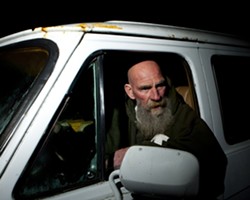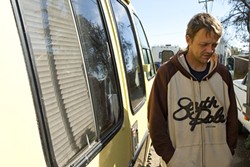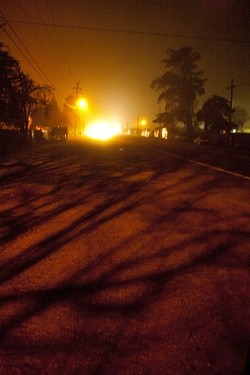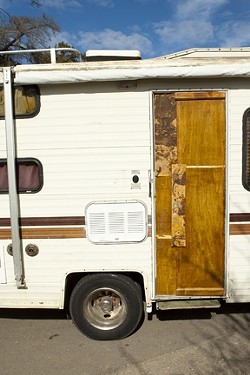You can't go home, and you can't stay here
Prado Road's homeless are caught in an unwanted game of cat and mouse with the city and police
By Colin Rigley[{
"name": "Ad - Medium Rectangle CC01 - 300x250",
"id": "AdMediumRectangleCC01300x250",
"class": "inlineCenter",
"insertPoint": "8",
"component": "2963441",
"requiredCountToDisplay": "12"
},{
"name": "Ad - Medium Rectangle LC01 - 300x250",
"id": "AdMediumRectangleCC01300x250",
"class": "inlineCenter",
"insertPoint": "18",
"component": "2963441",
"requiredCountToDisplay": "22"
},{
"name": "Ad - Medium Rectangle LC09 - 300x250",
"id": "AdMediumRectangleLC09300x250",
"class": "inlineCenter",
"insertPoint": "28",
"component": "3252660",
"requiredCountToDisplay": "32"
}]
Cars and vans tore through the gravel on Prado Road as they roared into the night. At about 10 p.m., Danny “Fresno” Braninburg was still waiting to make his escape, his head swiveling nervously like a malfunctioning wind up toy as he scanned the road.
With the clock ticking down to the police officers’ return, Fresno was anxiously waiting for his girlfriend to get ready so the two could get their van—indeed, their home—out of there. But to where, he didn’t know.
“They don’t say where to go; they say where you can’t go,” Fresno said shortly before pulling his beat-up silver van onto Prado Road and driving off into the dark.
This was the scene at the climax of an erratic game of cat and mouse between a group of local vagabonds and the San Luis Obispo Police Department. An ongoing battle, of sorts, has been waged over the industrial strip of highway onramp known as Prado Road, sandwiched between a graveyard and a sewage treatment plant in San Luis Obispo.
The spot between where the city buries its dead and where it throws away its waste seemed the only safe place left for the people who had nowhere else to go, the people who live out of vans, RVs, and cars.
On Feb. 17, at the tail end of days spent running from police, the people occupying Prado Road were given an ultimatum: Get out, or lose your home on wheels.
“They told me, ‘Apparently you don’t take this serious; we’re gonna be back with a tow truck,’” Fresno said.
Fresno, and a few others who had parked on Prado Road, said police were amping up threats against the loose community. First, officers handed out warnings. Then, they issued citations for illegal occupancy. Finally, they threatened to tow anyone who stayed behind.
The tow trucks never showed up that night, despite police threats. After most of the vehicles were gone, two police cruisers did show up, but they left soon after. (One resident later told New Times he was issued a citation at about 2:30 a.m.) An officer, who identified himself only as the watch commander, at first denied any allegation that police were threatening to tow vehicles on Prado Road. Then he told New Times and a television reporter on the scene, “The generic statement is that we’re out; we are enforcing the city’s ordinance.”
On paper, that ordinance allows that “no recreational vehicle, camper shell, automobile, or similar device shall be used for living or sleeping quarters except in a lawfully operated mobile home park, travel trailer park, or campground … .”
The reality is far more complicated, repeatedly triggering the question: Where are they supposed to go?
Rude awakening
In the late morning hours of Feb. 16, the question of place was one many of the temporary residents of Prado Road were attempting to answer.
At times, their voices ran together into a muddled drone of outrage. Amid the buzz of forklifts and cars streaming down Prado Road to and from the nearby highway onramp, the people who call that strip of nowhere home—or the closest thing to it—were still trying to figure out what had happened the night before.
“What doesn’t make sense,” said Susan Perez, shouting over the traffic, “is that they herded us here and they told us, ‘We’re herding you here on purpose.’”
The “us,” in this case? The dozen or so people living out of their cars on Prado Road. Vans and cars bordered the north side of the road that day, and RVs lined the south. The stretch resembled an impromptu campground.
But the “they” Perez mentioned were the eight SLO police officers who descended on Prado’s mobile encampment the night before. At about 3 a.m., they banged on doors, knocked their flashlights on car windows, and in some cases physically shook RVs to roust the people asleep inside. And then, one by one, they went down the line of cars and told many people to get out. They also issued citations.
Later that morning, David Eves was settled on his foldout stool, reflecting on his startling wakeup.
“I’d just started some pain medication, and I was sleeping soundly,” said Eves, whose voice and demeanor could easily be mistaken for that of comedian David Cross.
Eves has been in the area since October after officials in his previous home of Humboldt County paid him and other homeless people to go somewhere else—anywhere else, really. He subsists on welfare and food stamps, he said, and the deal in Humboldt was that he’d get gas money to go wherever he wanted if he promised to leave. Eves had hoped to go to Boston, but he was only given a fraction of the money he was told he’d get and decided instead to come to the Central Coast in hopes of calm weather.
Two months ago, Eves was cited for parking his van in SLO. During that run-in, he said the police told him to go back to Prado Road.
“They know there’s no better place,” he said.
But on Feb. 16, an officer told him to pack up and leave.
“He said [go] some place where it doesn’t look like a campground,” Eves said.
Most people on Prado Road said they’re used to getting shuffled around the city like so much unwanted clutter. Many have been rousted from their sleep and told to move; a few have been ticketed for committing the crime of living in their vehicles. Most recently, officers have threatened to tow their most prized possessions: their homes.
But the people at Prado Road didn’t end up there because they like the area; police told them to go there.
And now the police want them to go somewhere else.
Take Fresno: He’s been chased all over town, always told to move along, whether he’s been caught camping under a bridge or parked outside the cemetery. He’s been moved and hassled and ticketed, but he was eventually told to take himself, his girlfriend, and his van to Prado Road. Actually, the officer who told him to go to Prado Road a few months ago was the same one who banged a flashlight on his van at 3 a.m. on Feb. 16 and told him to move along or face a fine, Fresno said. He explained that he’s been cited and fined before, and he doesn’t intend to pay—mostly because he doesn’t have the money.
“They can’t put you in jail for just being alive,” Fresno said, occasionally pushing a cigarette through his thick gray beard to a pair of cracked lips. “But they can charge you money for just being alive, and then, if you don’t pay the money, they can put you in jail for just being alive.”
About half a dozen people received tickets for using a car as a dwelling on Feb. 16, which they said comes with a fine ranging from $200 to $450. People with cars and vans parked on the north side of the road were only given warnings and told to leave within a day. The people with RVs parked on the south side were cited, and also told to leave or their RVs would be towed.
“They don’t need to give us illegal lodging tickets,” Perez said. “That doesn’t do anything but make us poor and pissed off. … I don’t want to bother anybody; I don’t want to be bothered.”
Most of the people on Prado Road that day said the police told them to go there; the rest said they heard from friends that Prado Road is a safe place for RVs. To at least one person, it seemed they were all being set up.
“I’m already having a hard time making ends meet as it is, and then being hit with ticket after ticket, it’s kind of like kicking me when I’m already down,” said Chad McClure, a 34-year-old tile setter who’s received three illegal occupancy tickets this month for parking his mid-sized RV in SLO.
McClure said he can’t afford the tickets, and he’ll likely have to take jail time in lieu of paying the fine.
With little money for gas, many of the people packed up their things, strapped their bikes to their RVs, and schlepped a few miles down the road. By late afternoon on Feb. 16, most of the cars had gone, save for a few stragglers. The night passed without event. A few police officers motored down the road in the early morning hours between midnight and 4 a.m. while New Times was there to observe, but no citations were issued, nor were any warnings doled out.
However, a few miles down the road, where several people had moved their RVs to park on a cul-de-sac off Highway 101, the night wasn’t as peaceful. At about 5:30 a.m. on Feb. 17, police arrived at the new location and issued more citations.
“She said, ‘If you don’t get out of this town … I will find you,’” said Crystal Vernoy, still dressed in her bathrobe and clutching a small white Chihuahua later that morning.
According to Vernoy and a handful of other people who left Prado for a new place to sleep, police told them to leave town or face further fines and possibly the loss of their vehicles. After two days of moving and early morning wakeups, Perez was beginning to break down, at points choking back tears when she spoke.
“If we lose our RV, that’s all we have, and then we have to go back down into the creek beds, and they don’t want us to go into the creek beds,” she said.
A number of people at Prado Road told New Times that city officials regularly go to known camping spots to tear down campsites and remove trees and bushes to make it nearly impossible for anyone to return.
“They ruined it,” said Vanessa Smith, who’s been bouncing from camp to camp so she can avoid being spotted by authorities. “And everything’s been taken out—everything.”
Asked about the vehicle issue, Capt. Chris Staley told New Times, “We’ve had a number of complaints, especially off Prado Road, by business owners.”
But he said police hadn’t told anyone to go to Prado Road and never would—contradicting the statements of about half a dozen people who spoke to New Times for this story.
One thing is for certain: SLO police issued about 20 citations in less than a week for illegal occupancy, Staley said.
“It’s one of those issues that’s obviously got some sensitivities on both sides,” he said.
At the moment, it seems, there’s no place for people to stay safely if they’re living out of a car. This was much the same situation in Santa Barbara, where, following a wildly unpopular crackdown on overnight parking, the nonprofit New Beginnings Counseling Center began coordinating with city officials, churches, and other nonprofits in the area to establish safe places for people to park overnight. The result was the Safe RV Parking Program.
Applicants have to provide valid insurance, registration, and a driver’s license. Once they do, they can park in one of about 23 lots and 112 spaces. According to a member of New Beginnings, the program has been very successful, gaining national and international attention.
Similar projects in SLO, however, can’t seem to get off the ground.
According to Dee Torres, director of homeless services for the Community Action Partnership of San Luis Obispo County, the camping situation on Prado Road got a bit out of control.
“Since there really isn’t a place for people to stay in their cars, they started sending them here, I was told,” Torres said.
Some of the campers are registered sex offenders and therefore aren’t allowed in the Prado Day Center, she said, noting that such clients would previously camp at Sunny Acres on the western edge of town.
And thus far, efforts to mirror Santa Barbara’s RV parking program have gone nowhere. Torres said she’s been pitching such a program to city officials for months, and had hoped to start a pilot program on Feb. 1. However, the proposal is still trudging through various city departments. If SLO does eventually find a place for this disenfranchised population, the process will still take at least several more months.
Local homeless advocate Becky Jorgeson has also been pushing officials to establish a community village program, similar to a successful model in Portland, Ore.
Meanwhile, where should they go? The city doesn’t have an answer. When New Times asked City Manager Katie Lichtig where such people should take their vehicles, she had no definitive answer.
“It’s a difficult question to answer,” she said. “… We really are working on problem-solving policing and protecting the public’s health and safety, and that includes everybody in the community.”
Lichtig said complaints from nearby business owners about unsanitary conditions led to the sweeps at Prado Road.
“In a solution-oriented move, we were implementing or enforcing the longstanding law that exists and working to try to balance the need for addressing these concerns and protecting the public safety,” she said.
Yet she couldn’t offer any alternative location for the people there, and when pressed could only say that the city supports the Prado Day Center and the county’s 10-Year Plan to End Homelessness.
Barring a safe parking program, or the end of all homelessness, the only place left for the people at Prado Road is simply not here.
“It’s all about money,” McClure told New Times hours before he packed up his small RV to find a new place where he might avoid another citation. “It’s all about money, really—it’s all about money to them. It has to do with the image of the city. … It almost seems like it’s more expensive to live without a house than it is to live with a house.”
News Editor Colin Rigley can be reached at [email protected].
Latest in News
Comments (2)
Showing 1-2 of 2
Readers also liked…
-

Coast Unified teachers upset over new position's salary and qualifications
Oct 20, 2022 -

SLO police identify alleged driver who hit and killed couple
Dec 22, 2022 -

When the levee breaks: Oceano residents, county officials walk a tightrope of regulations to manage Arroyo Grande Creek, which some say led to the levee's failure in January
May 18, 2023











